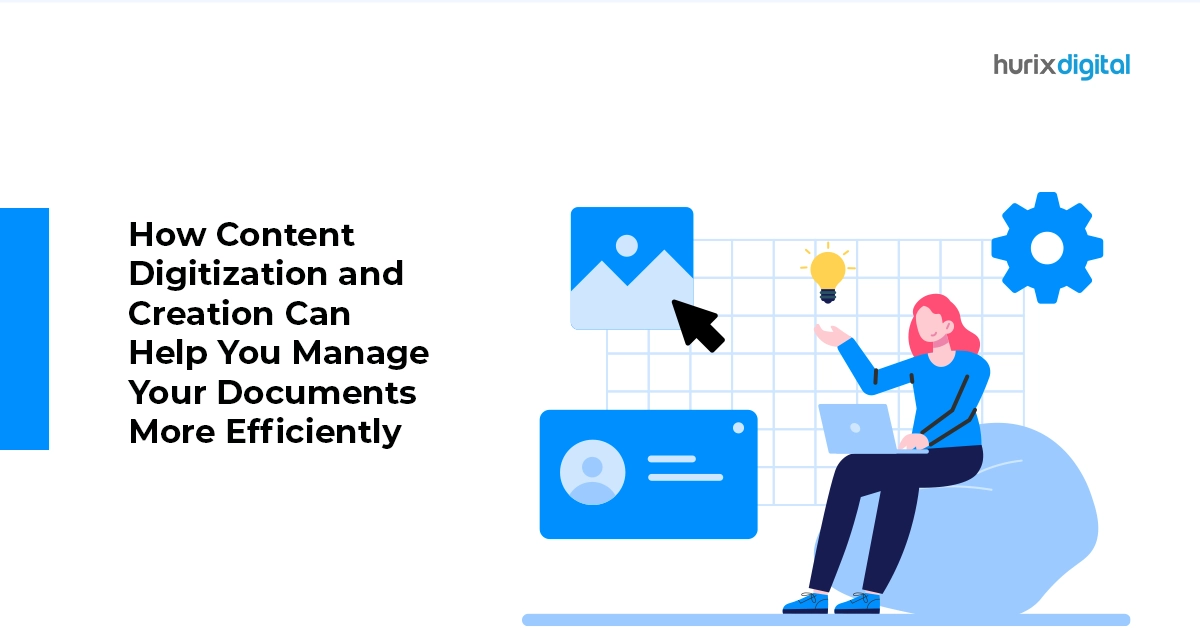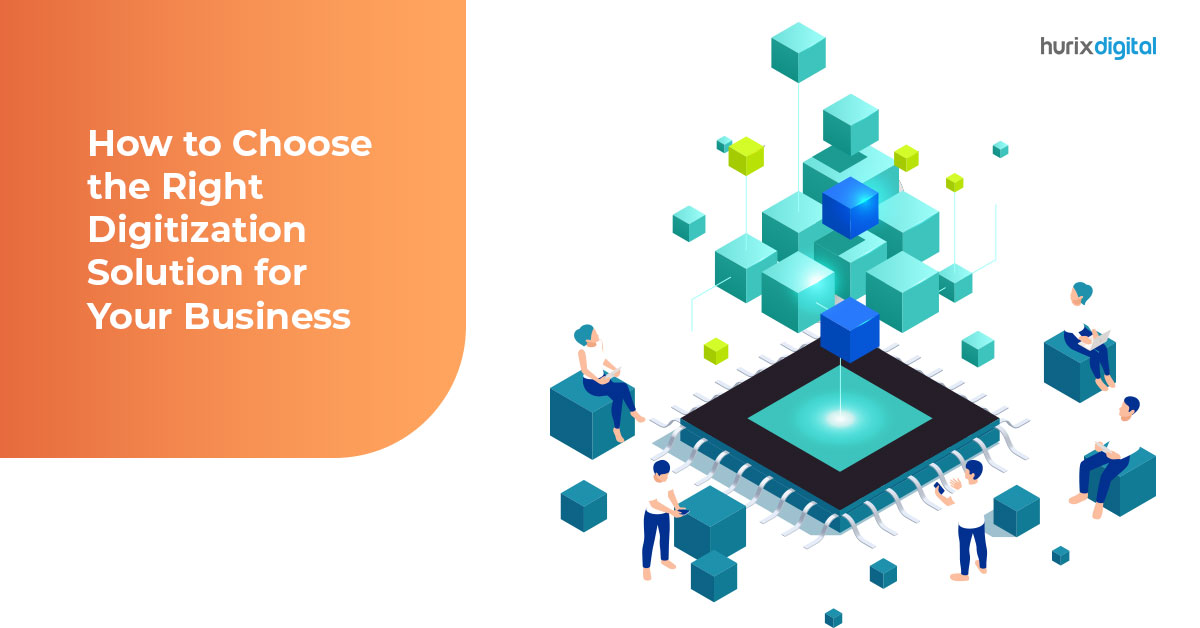From Paper to Pixel: How Content Digitization Services are Reshaping Information Management
Summary
Learn how content digitization is transforming information management. This blog explores the benefits and processes involved in digitizing paper-based content.
In today’s era, the world is witnessing a major shift from traditional documentation processes to digital formats across various industries.
Digital document services have fundamentally transformed how organizations manage their information. In this regard, content digitization not only increases efficiency but also offers numerous advantages in terms of accessibility, collaboration, and sustainability.
Read on as we take you through the importance, best practices, and other insights in the realm of content digitization. Let’s start!
Table of Contents:
- What is Content Digitization?
- Why is Content Digitization Important?
- Top Content Digitalization Practices to Check Out
- Key Features of Digitalized Information Management Services
- The Role of Content Transformation and Content Digitization in Business Growth
- Final Words
What is Content Digitization?
Content digitization services streamline the process of converting content into a digital format suitable for online platforms. It encompasses incorporating text and images into digital content.
The content digitization sector is experiencing significant growth, reflecting the increasing demand for content digitized solutions for managing information effectively. This process involves converting analog information, such as physical documents, images, or videos, into digital formats that can be easily stored, accessed, and manipulated electronically.
Also Read: The Comprehensive Guide to Great Content Conversion Services and Why They’re Beneficial
Why is Content Digitization Important?
Gone are the days when organizations had to depend on binders, folders, and emails to serve their content and data needs. Thanks to the advancement of content digitization services, organizations can now procure and assess content more effectively.
Here are a few benefits of content digitalization that highlight its importance in today’s business landscape:
1. Increased Productivity and Higher ROI Opportunities
Searching for paper documents stored within a company can be quite time-consuming and tedious for an employee. However, with well-executed content digitization, this task can be reduced to mere seconds, thus leading to better productivity and higher ROI opportunities.
2. Content Conversion Capabilities
Organizations can now indulge in digitizing and converting various information into digital images across a variety of file formats.
They can use:
- Optical Character Recognition to reduce error rates
- Image Improvement for high-quality images includes de-skewing, contrast correction, cropping, coloring, sharpening, etc.
- XML conversion from legacy data formats offers cross-platform syntax, allowing content to be utilized in various ways.
- ePUB Conversion, wherein ePUB3 offers the ability to hyperlink text, add multimedia elements, convert from PDF to ePUB, especially for eBooks, and incorporate SEO capabilities.
3. Access to Updated Content
Content digitalization empowers employees across different locations to access training programs. This accessibility is beneficial even for startups with few branches.
With an elite Learning Management System, access to external educational content becomes readily available. With regularly updated content according to trends, demands, and industry standards, you can stay informed about the latest developments.
4. Cost Efficiency
Content digitization significantly reduces expenses compared to paper-based management.
Paperwork management entails various costs, such as equipment, funds, and record management, which are substantial investments for companies. However, content digitalization services consolidate these costs into a single framework.
5. Enhanced Information Management Services
Information management partners have revolutionized the way businesses handle paperwork. These services streamline processes for converting physical documents into digital formats. This transition facilitates quicker access, better organization, and significant time savings.
6. Measured Data
Digitizing content allows organizations to monitor employee responses to training sessions and assess their learning progress. This information can identify employees who may require additional support to reach their full potential and for further advancement opportunities.
8. Disaster Recovery
Another core feature of content digitalization is the low risk of data loss in the event of damage. As compared to paper documents, online content, and data remain retrievable even if analog formats are destroyed, ensuring business continuity.
Top Content Digitalization Practices to Check Out
Below are some of the best content digitization practices to consider for optimizing processes and deriving maximum benefits:
1. Analyze Each Content Set or Collection
Organizations must research best practices for digital capture methods, hardware, and workflows and consult stakeholders for insights that will lead to successful digitization projects. It makes it crucial to analyze each content set or collection before embarking on the digitization process.
2. Take Audience Consideration into Account
Researching the audience demographics helps with project structuring and metadata requirements. It helps in creating digitized content that aligns with the preferences and needs of the intended audience.
3. Focus on Metadata Management
Descriptive metadata describes the content and provides context, thus enhancing the usability and accessibility of digital content. Considering both eventually facilitates content searchability and engagement.
Also, make sure you implement a standardized approach to metadata, ensuring consistency across all digitized content.
4. Measure Data Properly
Digitizing content allows organizations to track employee engagement with learning programs and assess learning progress. Business entities can use this to identify areas for improvement and recognize high-performing individuals. It also enables easy access to training materials for retraining or onboarding new team members.
Key Features of Digitalized Information Management Services
Information Management partners offer digital content solutions with several essential features, such as:
- Onsite scanning services prioritize data confidentiality by eliminating the need to transport documents elsewhere.
- Utilizing high-end scanning devices guarantees high-quality images, regardless of document type or volume.
- Recognizing the importance of time, these services focus on swift digitization without compromising quality.
- Trained scanning professionals proficiently manage various tasks, ensuring a seamless and trouble-free conversion of paper documents into digital formats.
- Optical Character Recognition (OCR) technology plays a crucial role in Information Management services, enabling scanned images to become searchable and editable text.
The Role of Content Transformation and Content Digitization in Business Growth
Here are some critical ways in which content digitalization can increase efficiency and prove beneficial for business growth:
- It optimizes efficiency, allowing employees to redirect their time towards high-quality project delivery while empowering them with access to previously inaccessible learning materials.
- Additionally, content digitization streamlines processes, leading to substantial cost savings and improved ROI opportunities, particularly in hassle-free employee training sessions that eliminate the need for expensive procedures.
- Moreover, systematic digitization facilitates faster organization, updating, reuse, alteration, and distribution of content, contributing to enhanced operational agility.
- Beyond operational benefits, content transformation fuels innovation, reduces attrition, and engages top talent through unique opportunities, while standardizing policies ensure managers have access to updated records.
Also Read: How to Create Accessible Content: 7 Tips for Digital Marketers
Final Words
Businesses worldwide strive for content digitization due to its organizational benefits. It helps in data management, increases operational efficiency, and ensures a smooth transition to a more sustainable and agile work environment.
This necessitates a shift in imbibing new learning cultures, promoting employee engagement, and building unique organizational structures by optimizing content and data.
Hurix Digital specializes in educational content development and instructional design services, offering tailored solutions that integrate content digitization seamlessly into organizational workflows.
Feel free to get in touch with us to explore how we can work together for your organization’s success!

Vice President – Digital Content Transformation. He is PMP, CSM, and CPACC certified and has 20+ years of experience in Project Management, Delivery Management, and managing the Offshore Development Centre (ODC).







